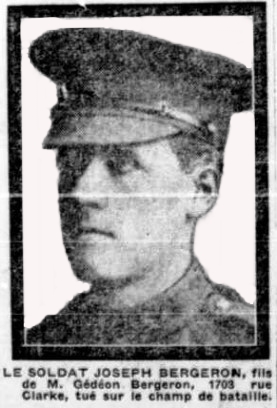Pte
Joseph Bergeron
Information about birth
|
Date of birth: 18/10/1894 |
|
Place of birth: St-Grégoire, Quebec, Canada |
General information
|
Profession: Woodsman |
|
Religion: Roman Catholic |
Army information
|
Country: Canada |
|
Force: Canadian Expeditionary Force |
|
Rank: Private |
|
Service number: 754033 |
|
Enlistment date: 12/02/1916 |
|
Enlistment place: Blind River, Ontario, Canada |
|
Units: — Canadian Infantry, 52nd Bn. (Last known unit) |
Information about death
|
Date of death: 26/10/1917 |
|
Place of death: Waterloo, 's Graventafel, Belgium |
|
Cause of death: Killed in action (K.I.A.) |
|
Age: 23 |
Cemetery
|
Tyne Cot Cemetery Plot: XIV Row: F Grave: 22 |
Points of interest 1
| #1 | Sterfteplaats |
My story
Joseph Bergeron, a former woodsman, was born on the 18th of October 1894 in St-Grégoire, Quebec, Canada. He was the son of Gédéon Bergeron and Emma Abran and had 6 siblings.
He enlisted in his hometown of Blind River, Ontario, Canada on the 12th of February 1916.
Joseph served as a Private in the 52nd Canadian Battalion, part of the 9th Canadian Brigade of the 3rd Canadian Division.
In October 1917, the 52nd Canadian Battalion played a pivotal role during the intense fighting around Ypres, specifically in the Battle of Passchendaele. After weeks of preparation, the battalion moved closer to the front lines, eventually reaching St-Jean on October 22. The weather was unrelenting, with showery days hampering the soldiers’ efforts to complete equipment checks and finalize preparations for the offensive.
By October 24, the 52nd had relieved the 1st Wellington Battalion at the Fommern Castle, preparing for the impending battle. On October 25, the battalion's C and D companies were positioned behind the front lines to support the 43rd and 58th Canadian Infantry Battalions, while A and B companies stayed in reserve. On the morning of October 26, the 3rd Canadian Division launched its attack at Zero Hour, 5:40 AM, aimed at capturing the Bellevue Spur of Passchendaele Ridge.
The initial assault showed promise, but by 8:30 AM, it became clear that the 43rd and 58th Battalions had suffered devastating losses and were forced to retreat. In response, the 52nd’s C and D companies moved forward to support their comrades. Despite heavy shelling and constant sniper fire, the battalion held its ground, capturing 275 prisoners and 21 machine guns, although the severe conditions made it impossible to retrieve all the captured weapons.
By October 27, the Germans began to counterattack, shelling the ridge and increasing sniper activity, wounding several soldiers. The 116th Canadian Infantry Battalion relieved the 52nd later that evening. Despite exhaustion, the battalion's commitment remained unshaken, as they managed to evacuate all wounded, including soldiers from the 43rd and 58th Battalions, and handed over captured machine guns.
On October 28, the battalion, now in support, took a brief respite, reorganizing and preparing for relief by the Princess Patricia’s Canadian Light Infantry. The month ended with the men of the 52nd having made significant contributions to the bitter, bloody struggle that defined Passchendaele.
Joseph Bergeron, aged 23, was killed in action on the 26th of October 1917. Private Bergeron’s body was found near Waterloo, ‘s Graventafel at 28.D.9.d.90.90. His remains were later exhumed and reburied at The Tyne Cot Cemetery at Plot XIV, Row F, Grave 22.
He enlisted in his hometown of Blind River, Ontario, Canada on the 12th of February 1916.
Joseph served as a Private in the 52nd Canadian Battalion, part of the 9th Canadian Brigade of the 3rd Canadian Division.
In October 1917, the 52nd Canadian Battalion played a pivotal role during the intense fighting around Ypres, specifically in the Battle of Passchendaele. After weeks of preparation, the battalion moved closer to the front lines, eventually reaching St-Jean on October 22. The weather was unrelenting, with showery days hampering the soldiers’ efforts to complete equipment checks and finalize preparations for the offensive.
By October 24, the 52nd had relieved the 1st Wellington Battalion at the Fommern Castle, preparing for the impending battle. On October 25, the battalion's C and D companies were positioned behind the front lines to support the 43rd and 58th Canadian Infantry Battalions, while A and B companies stayed in reserve. On the morning of October 26, the 3rd Canadian Division launched its attack at Zero Hour, 5:40 AM, aimed at capturing the Bellevue Spur of Passchendaele Ridge.
The initial assault showed promise, but by 8:30 AM, it became clear that the 43rd and 58th Battalions had suffered devastating losses and were forced to retreat. In response, the 52nd’s C and D companies moved forward to support their comrades. Despite heavy shelling and constant sniper fire, the battalion held its ground, capturing 275 prisoners and 21 machine guns, although the severe conditions made it impossible to retrieve all the captured weapons.
By October 27, the Germans began to counterattack, shelling the ridge and increasing sniper activity, wounding several soldiers. The 116th Canadian Infantry Battalion relieved the 52nd later that evening. Despite exhaustion, the battalion's commitment remained unshaken, as they managed to evacuate all wounded, including soldiers from the 43rd and 58th Battalions, and handed over captured machine guns.
On October 28, the battalion, now in support, took a brief respite, reorganizing and preparing for relief by the Princess Patricia’s Canadian Light Infantry. The month ended with the men of the 52nd having made significant contributions to the bitter, bloody struggle that defined Passchendaele.
Joseph Bergeron, aged 23, was killed in action on the 26th of October 1917. Private Bergeron’s body was found near Waterloo, ‘s Graventafel at 28.D.9.d.90.90. His remains were later exhumed and reburied at The Tyne Cot Cemetery at Plot XIV, Row F, Grave 22.
